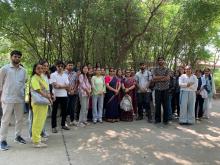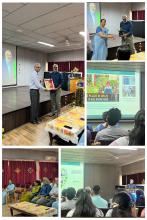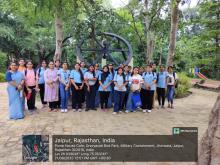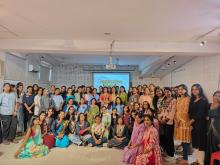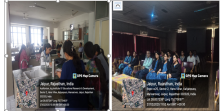The Department of Zoology organized an educational visit to Nahargarh Biological Park, Jaipur, on October 4, 2025, for all Undergraduate, Postgraduate, and Research Scholars. The visit aimed to enhance students’ understanding of biodiversity, animal behavior, and ecological balance through firsthand observation. During the trip, students explored various enclosures housing native and exotic species and learned about their habitat, feeding patterns, and conservation status. Faculty members, along with the Hope Wildlife guide, provided valuable insights and explanations, helping students connect classroom concepts with real-life observations. The visit proved to be an enriching and informative experience, fostering environmental awareness and inspiring greater interest in wildlife conservation and zoological studies.
Department News
The Department of Zoology at IIS (Deemed to be University), Jaipur, hosted an insightful guest lecture titled “Downloading Health & Happiness, Deleting Cancer & Stress” on 25th September 2025. The session was led by Dr. Amit Sharma, a noted Cancer Health Advisor and Cancer Scientist, known for his expertise in cancer research and holistic health practices.
Open for all Life Sciences students and faculty, the lecture highlighted the integration of modern scientific research with mental well-being, lifestyle management, and preventive healthcare. Dr. Sharma stressed the importance of emotional resilience and healthy habits in combating diseases like cancer and improving overall quality of life.
40 students and 7 faculty members were actively engaged throughout the session. A lively Q&A segment allowed attendees to interact directly with the speaker, further enriching the experience.
The session concluded with a vote of thanks and received positive feedback from participants for being both educational and inspirational.
An educational visit was organized by the Department of Zoology to the Bird Park at Shastri Nagar, Jaipur on 21st August 2025. A total of 70 students from B.Sc. (PC & B.Ed.), B.Sc. (Honours), and M.Sc. courses participated in this academic excursion.
The main objective of the visit was to provide students with practical exposure to avian biodiversity and enhance their understanding of bird ecology in a natural setting. The Bird Park, with its lush greenery and peaceful atmosphere, offered an ideal environment for learning and exploration. Students enjoyed walking through the park, observing various bird species, and experiencing nature closely. They showed great enthusiasm while engaging in bird watching, taking photographs, and discussing their observations with peers and faculty members. The visit was not only educational but also refreshing, offering a break from the regular classroom routine. It allowed students to apply their theoretical knowledge in the field while enjoying the beauty and serenity of the surroundings. The trip concluded with a reflection session where students shared their experiences and learnings. Overall, the visit was a successful and enjoyable experience that fostered ecological awareness, curiosity, and a deeper appreciation for biodiversity.
The Department of Zoology hosted an engaging Orientation Programme on 13th August 2025 at Aditya Hall.
59 freshers from B.Sc. (Honors), B.Sc. B.Ed., Pass Course, and M.Sc. Semester 1 attended the orientation. The ceremony began with a traditional and heartfelt welcome by applying tika, pinning batches, and offering sweets to all the newcomers, making them feel a part of the zoology family right from the start.
The programme commenced with a serene Ganesh Vandana, invoking blessings for a successful academic journey ahead.
Following the invocation, Dr. Lata Shahani, Head of the Department, addressed the students. She shared a detailed overview of the academic schedule, examination patterns, and the various departmental activities conducted throughout the year. Her session also included highlights of educational visits, conferences, and a brief introduction to the vibrant alumnae network, encouraging students to engage actively and make the most of the opportunities provided.
To make the environment more engaging, the programme included cultural dance performances, fun activities, and an interactive quiz session, helping the newcomers bond with their peers and seniors while getting a feel of the departmental atmosphere.
Adding a special touch, research scholars introduced the faculty members by dedicating heartfelt lines to each, helping students familiarize themselves with their mentors in a warm and personal manner.
The success of the programme was made possible by the enthusiastic involvement of 22 participants, including senior students and scholars, who performed, managed, and coordinated various segments of the event.
The event concluded on a joyous note with a group photograph, capturing the smiles, excitement, and the beginning of a new journey for our budding zoologists.
ODD SEMESTER (2025-26)
B.Sc. (PC) Sem: I
B.Sc. (PC) Sem: III
B.Sc. (PC) Sem: V
B.Sc. (Honours) Sem: I
B.Sc. (Honours) Sem: III
B.Sc. (Honours) Sem: V
M.Sc. Sem: I
M.Sc. Sem: III
We are delighted to announce that Dr. Anju Sharma, esteemed faculty member of the Department of Zoology, has been awarded a prestigious research project by the Department of Science and Technology (DST), Rajasthan in 2025.
The project is titled:
“Impact of Microplastics on Neurobehavioral and Neurodegenerative Changes in Diabetic Male Swiss Albino Mice with an Emphasis on Therapeutic Targets.”
This cutting-edge project reflects Dr. Sharma’s dedication to investigating emerging environmental threats like microplastics and their impact on neurological health, particularly in vulnerable diabetic models. The study aims to explore underlying mechanisms and identify potential therapeutic interventions.
The department congratulates Dr. Anju Sharma on this significant achievement and wishes her success in this meaningful scientific pursuit.
– Department of Zoology
The IIS (Deemed to be University), Jaipur
We are proud to announce that Dr. Neelu Kanwar Rajawat, faculty member of the Department of Zoology, has been awarded a prestigious research project by CSIR-ASPIRE in 2024.
The project is titled:
“Neuroprotective Potential of Microbial Derived Pharmacological Molecule for the Treatment of Parkinson’s Disease.”
This remarkable achievement highlights Dr. Rajawat’s continued contribution to cutting-edge research in neurobiology and microbial therapeutics. The project aims to explore innovative microbial solutions for managing neurodegenerative disorders, particularly Parkinson’s disease.
The department congratulates Dr. Neelu Kanwar Rajawat and wishes her great success in this impactful scientific endeavor.
– Department of Zoology
The IIS (Deemed to be University), Jaipur
The Department of Zoology extends its heartfelt congratulations to Ms. Manisha (Ph.D.), Ms. Nehal (P.G.), and Ms. Priyanshi (P.G.) on their remarkable achievement of clearing the CSIR-NET (JRF) examination.
Your hard work, dedication, and academic excellence have brought pride to the department and serve as an inspiration to your peers. We are confident that this success will open new avenues for your research and professional journey.
Wishing you continued success in all your future endeavors!
– Department of Zoology
The IIS (Deemed to be University), Jaipur
In order to celebrate Science day, Department of Zoology organized two exciting activities Best Out of Waste and Movie Screening on 27th February, 2025, aimed at promoting creativity, scientific thinking, and awareness about environmental sustainability. The first activity, "Best Out of Waste," was organized in the Department of Zoology at 9:30 AM. This event encouraged students to use waste materials and transform them into innovative and useful creations. The purpose of this activity was to inspire students to think creatively while also raising awareness about recycling and reusing materials to reduce environmental waste. A total of 22 students participated in this activity, showcasing their artistic skills and environmental consciousness by designing unique items from waste materials. The creations ranged from decorative pieces to functional items, all made with recyclable and discarded materials. The event not only provided a platform for students to express their creativity but also helped them realize the value of sustainability and the importance of reusing materials in everyday life.
The second event of the day was a movie screening, which took place at 10:30 AM in the AV Hall. The movie “Life Before Birth - In the Womb” was selected for the screening. This documentary explored the fascinating journey of human development from conception to birth, offering an in-depth look at the biological processes involved in fetal development. The movie was not only educational but also captivating, providing students with a deeper understanding of life science, embryology, and the complexity of human growth. The movie sparked thoughtful discussions among students about the importance of prenatal development and the scientific aspects of life before birth. It served as an insightful learning experience, aligning perfectly with the theme of the day and further encouraging students to appreciate the wonders of life science.


